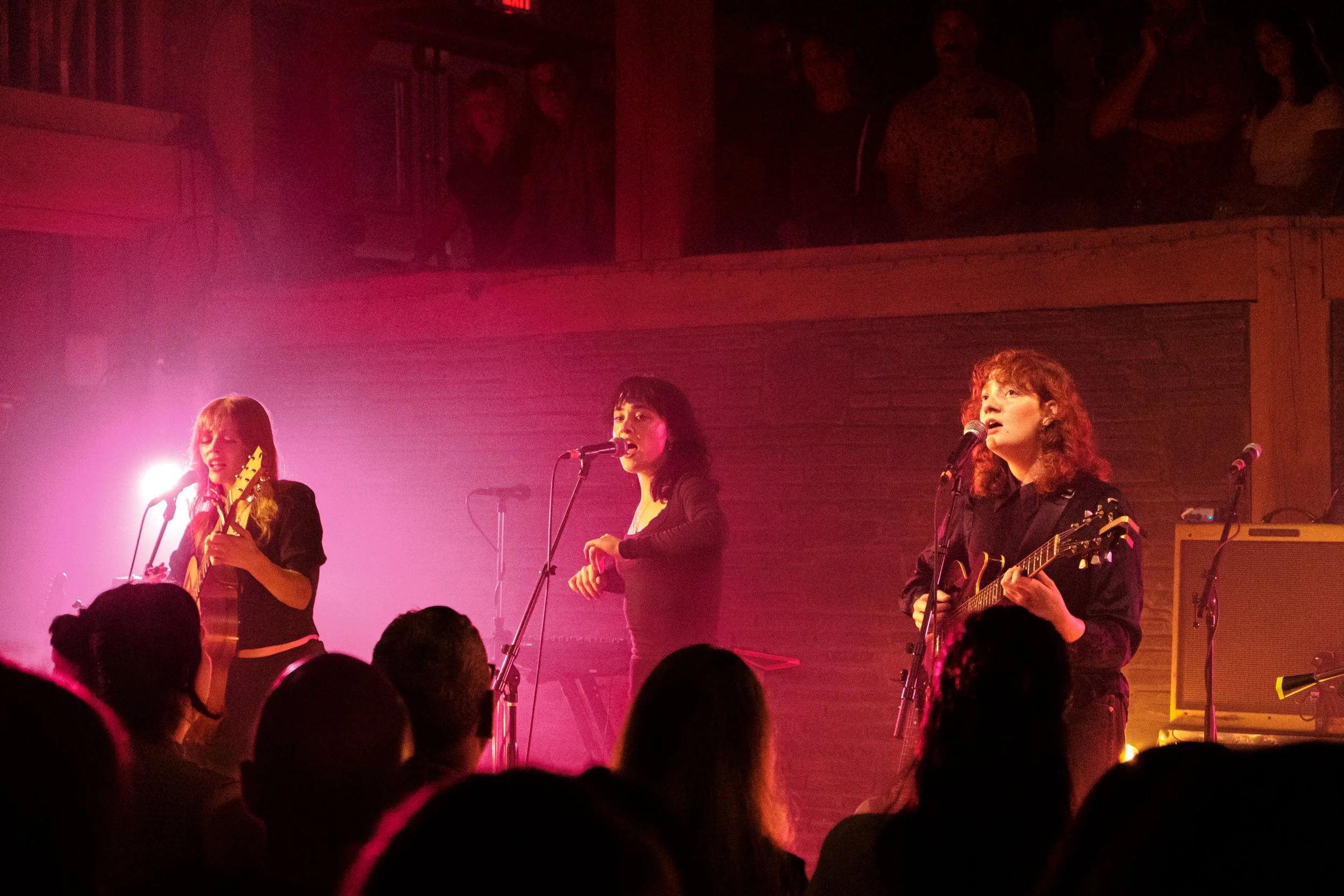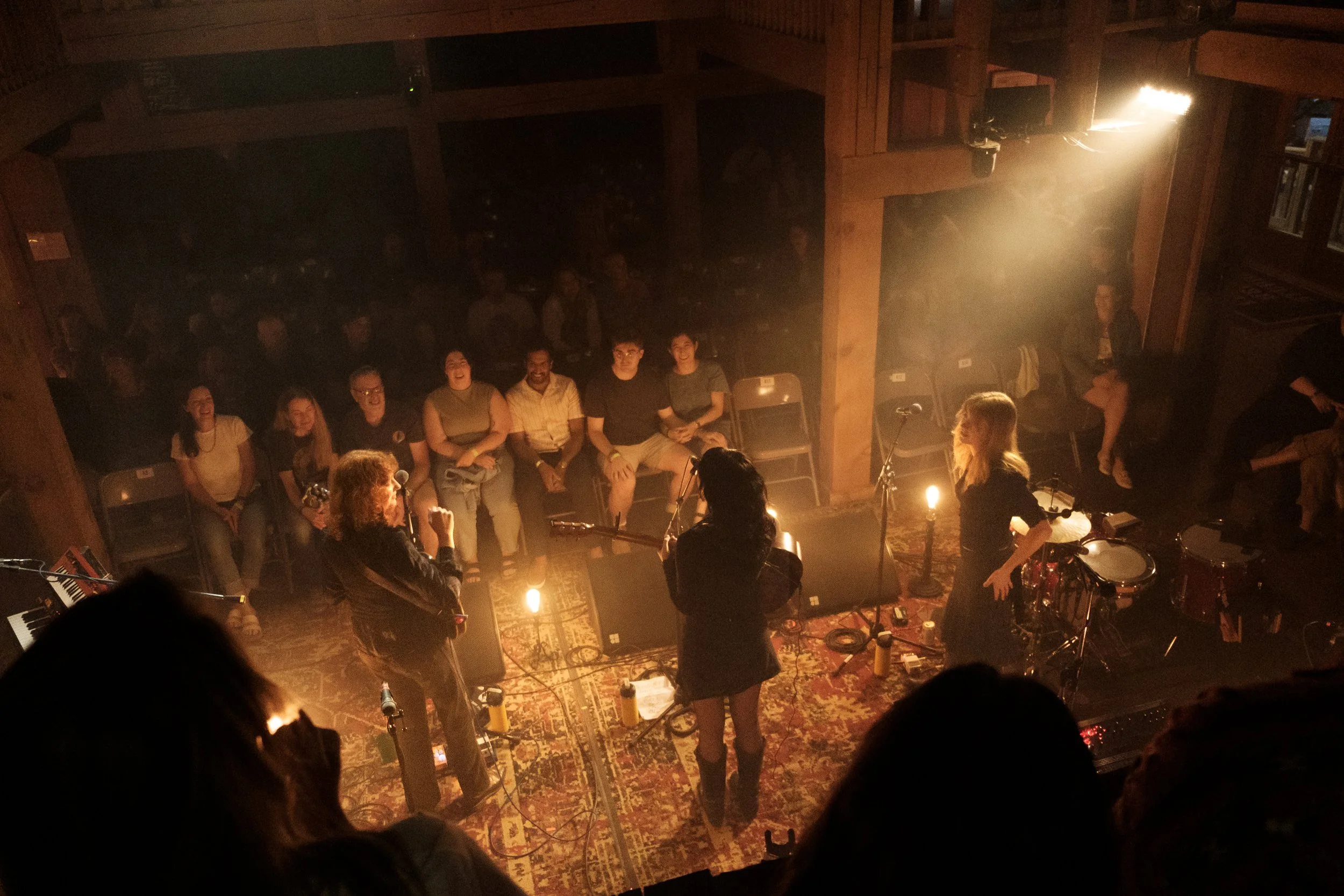INTERVIEW/REVIEW: Folk Bitch Trio Declare “Now Would Be a Good Time” to get Out of Your Head
Photos by Pete Perry
“Being a musician is a pretty bizarre career and life choice. Finding anyone who’s like-minded or shares the same values in this scene is incredibly special.”
I was freshly reeling from grief when I first saw them.
Out on the back porch at Levon Helm Studios in Woodstock, talking to my friend Isabella about inconsolable loss, when I spotted three indie darlings harmonizing softly under a blue spotlight. Their name? Folk Bitch Trio.
“Thank God,” I thought. I went in preparing to cry. I had shown up looking for catharsis, looking to be cracked open.
On their own Bancamp, Folk Bitch Trio writes that “Folk music, after all, has a bad habit of being presented as a deathly serious concern. It’s something you cry to, overly sacred, solemnly considered by critic-historians.” I was fully ready to sink into that sadness. But instead of the raw heartbreak soundtrack I expected, I got something...cheeky. Clever. Off-kilter.
It was unexpectedly dry, yet refreshingly ironic. Their humor was so deeply embedded in the music that it caught me off guard. Here I am hyping myself up for this big release and all I could do was have a nice quiet chuckle. Then it hit me: maybe catharsis wasn’t the point here. Maybe poking fun at the seriousness of tender feelings — and still finding beauty in them — was the whole thing.
I had my first hard breakup earlier that evening. It was all raw emotion, an urge to escape it. You know the type—bleach your hair, crash out, throw on THAT playlist, and tell yourself, I gotta get the fuck outta here.
So I did. And I went to Woodstock, New York.
Everyone in town knows Levon Helm Studios, home of The Band and a one-time hideout for recording with the likes of Mavis Staples and Bob Dylan. After Levon’s passing, his family renovated the space into a music-centered compound. They live on the “quiet side,” while next door, their wooden shed hosts live music. Think NPR’s Tiny Desk meets summer arts camp.
At one point between songs, Heide (they/them) acknowledged their bandmates and felt “in the music” together. The show had an eerie sense of calm. It was funny and darkly ironic. It felt like watching a show within a show—like a femme band you’d see in a David Lynch film.
I wanted sincerity, pain, and melodrama. I wanted the kind of music that bleeds. And instead, here were these three Australian indie darlings—Heide, Jeanie (she/her), and Gracie (she/her)—delivering harmonies and lyrics with a wink, like they were in on something I wasn’t. What’s the secret?
When we connected for an interview, I admitted to them I’d been crying for hours earlier that day. That I came expecting to cry more. But during their set, even amidst lyrics about lovesickness and loser exes, I laughed a little. They nodded at me with a kind of “good on you, mate” acknowledgment.
Rather than damning or glamorizing feelings, they were simply present in the performance. It was smart and sad and funny all at once. They were collaborators—offering a comfortable escape with the audience, not delivering some one-sided show of heartbreak.
Ironically, while the project of presence in the music is serious, catharsis is far from the goal.
“I never know what to say when people associate our music with crying,” Jeanie said, “even though being moved is beautiful.”
Gracie added with a smile, “I cry very easily, and onstage very often. It’s good to cry — but laughter comes first.”
Their music has the incredible strength to transport you to a world of visuals and aesthetics. It creates a vibe, not just a message. I couldn’t figure out the joke; I was feeling too deeply, damnit!
And then I realized what I was doing…and laughed again.
Many writers and other creatives are drawn to sincerity. But sometimes, sincerity taken to the edge becomes melodrama—and that’s not necessarily a bad thing. It’s something my 14-year-old self lived for when I was a heavy Lana Del Rey fan, obsessed with tragic glamour and theatrical sadness. I grew up romanticizing everything. And I still carry that lens—one that’s always searching for the emotional climax, the moment of truth, the gut-punch line.
“Being a musician is a pretty bizarre career and life choice,” Heide told me. “Finding anyone who’s like-minded or shares the same values in this scene is incredibly special.”
Folk Bitch Trio challenged me to see a different kind of storytelling. One that doesn’t scream in agony to be heard. One that doesn’t cry at you, but instead makes space for their audience to recognize themselves—quietly, ironically, maybe even joyfully. They appreciate others who can laugh at absurdity with them.
Take “Moth Song” for example: a song about being so spun out after a breakup you don’t know which way is up, but still longing for the idea of a bright light to come home to, even if that light was never really that warm.
“It’s an admission of disappointment in reality and wishing for more. There’s great vindication in saying that out loud,” Gracie said. And that’s the intention. You wanted more than what you saw. The lyrical genius of Now Would Be a Good Time comes in finding real resolve through a relatably theatrical situation.
“Even in these songs like ‘Mary’s Playing the Harp,’” Gracie continued, “it’s a love song that’s absolutely devastating. However, in the chorus we say, ‘I’m a long way from home. I’m a nice clear view.’ It’s not woe is me. It’s here’s my heart. I’ve gotta keep on going. Whatever.”
In a sense, Now Would be A Good Time is a missive from three performing best friends finding beauty and wisdom where they can, together. To live free of lovesickness and broken promises from shitty exes. Again, from their Bandcamp, the goal is always “knowing when to sink into contemporary nihilism, and when to have a laugh with your friends. Remembering that being alive can feel so ephemeral and unreal, and finding a way to make it artistic again.”


